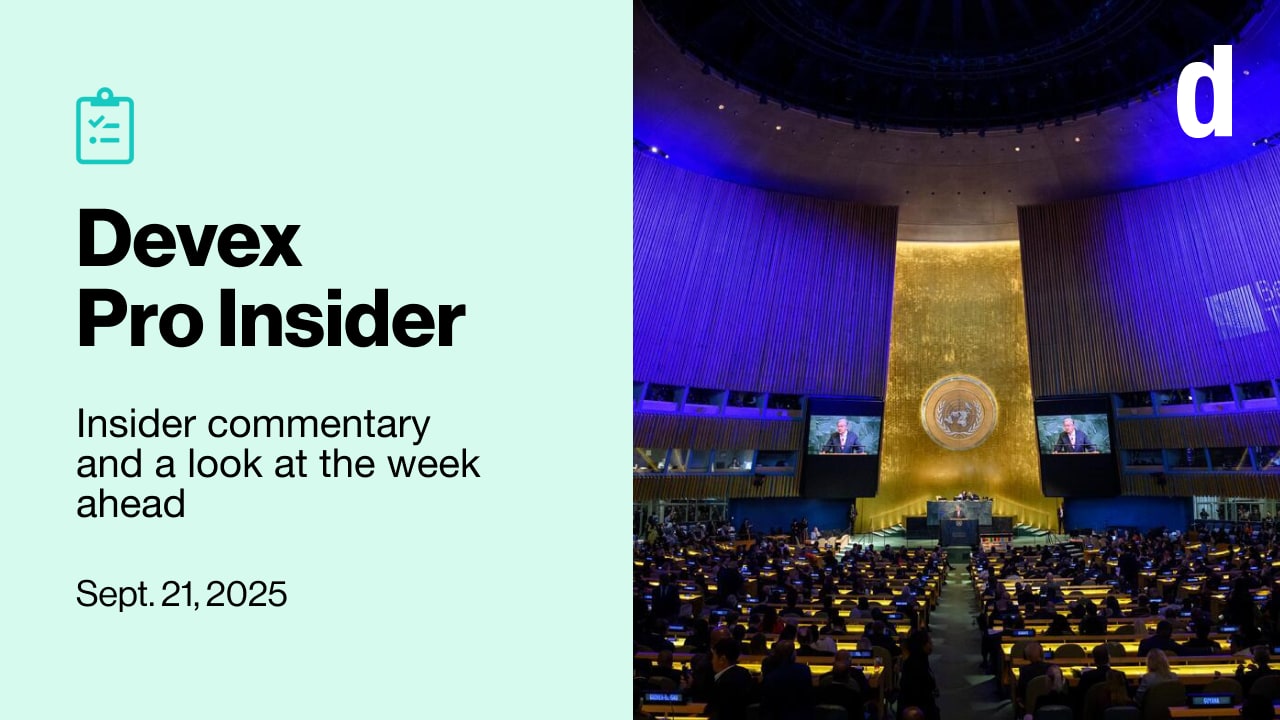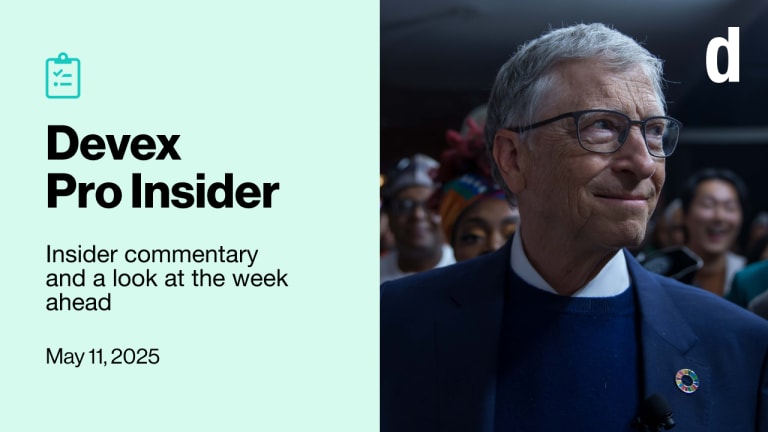Devex Pro Weekender: Humanitarians take over Parliament and a curious climate resignation
Surprises in the U.K. election, the search for WHO’s next Africa director heats up, and a corporate climate leader steps down.
The United Kingdom election last week delivered the expected result, and the country is now in the hands of a Labour government. But not everything went as anticipated. Lisa Nandy, the Labour politician who had spent 10 months preparing to become the country’s development minister, didn’t wind up getting the job. Instead, she was given the role of Secretary of State for Culture, Media and Sport, although that brief does include responsibility for civil society and the U.K. charity regulator. Meanwhile, the development portfolio went to Anneliese Dodds — but there was some confusion around the announcement, as the word “development” doesn’t actually appear in her job title, and it also appears to be a part-time role. The election came with a few other surprises, too. Read on for more. Coming up: I’m excited to reveal the full line-up of events for Devex Pro Week! Join us July 22-26 for: • Exclusive insights from former White House staffer Ben Rhodes into what the United States election means for global development. • A practical guide to how global development practitioners can use artificial intelligence, with demos of key tools from experts at OpenAI, the Gates Foundation, and more. • And a review of USAID’s localization work as we head toward the next presidential election. Also in today’s edition: Humanitarians takeover parliament, the search for WHO’s next Africa director heats up, and EBRD finally starts its move into sub-Saharan Africa. Jessica Abrahams Editor, Devex Pro Bits and pieces A humanitarian takeover. Despite uncertainty about the position of international development within the new U.K. government, those in the sector might be pleased to know that several of their peers were elected to Parliament. They include Kirsty McNeill, who until recently was an executive director at Save the Children UK but has now taken up her seat as MP for Midlothian. “I’ll be guided by the same mission as I was in the old one: helping to create a world in which everyone is safe and everyone has enough,” she wrote on LinkedIn. “If you’re doing your bit working in, volunteering for or otherwise supporting organisations like Save the Children UK to make things fairer, you have my admiration and thanks and you’ll always have a friend in me.” Joining her in Parliament are Laura Kyrke-Smith, former U.K. executive director of the International Rescue Committee, who is now MP for Aylesbury, and Melanie Ward, chief executive of Medical Aid for Palestinians, who won the seat of Cowdenbeath and Kirkcaldy. Corporate climate controversy. Luiz Amaral, CEO of the world’s leading arbiter of corporate climate targets, is stepping down in curious circumstances. The Science Based Targets initiative develops standards and tools to help companies set ambitious emission reduction targets in line with what is needed to reach net zero by 2050. It started as a collaboration between nonprofit groups, including the World Wide Fund for Nature and the World Resources Institute, as well as the UN Global Compact. But as it expanded its paid-for validation services, it also raised philanthropic funds, particularly from the Bezos Earth Fund, the Financial Times reports. Then, in April, SBTi announced that the companies it assesses would be allowed to use carbon offsets at scale to meet their climate pledges — a controversial approach. That led to dozens of staff members calling for Amaral’s resignation. Some suspect a connection to SBTi’s funding sources — the Bezos fund has put a lot of money into carbon market initiatives, although CEO Andrew Steer has strongly denied that they have anything to do with the decision. Now, three months later, Amaral has announced his departure for “personal reasons”, which “require my full attention at this time.” He has been in the role for a little over two years and will leave at the end of the month. Chief Legal Officer Susan Jenny Ehr will step in as interim CEO. WHO Africa race gets hot. Dr. N’da Konan Michel Yao is no longer competing for the top job at the World Health Organization’s regional office for Africa after his nominating country — Côte d’Ivoire — pulled out of the race. Yao is WHO’s director of strategic health operations. He was among those who were put on paid leave during investigations into whether senior officials responded promptly to reports of sexual exploitation during an Ebola outbreak in the Democratic Republic of Congo, according to the Financial Times, but was later cleared by a U.N. investigation and reinstated. In a LinkedIn post announcing his withdrawal from the race for regional director, he said he wished for “a peaceful campaign far from lies and attacks,” having previously complained about misinformation around his candidacy. Four men remain in the race: Dr. Boureima Hama Sambo, proposed by Niger; Dr. Ibrahima Socé Fall, proposed by Senegal; Dr. Richard Mihigo, proposed by Rwanda; and Dr. Faustine Engelbert Ndugulile, proposed by Tanzania. There has been some controversy around the absence of female candidates. Current regional director Matshidiso Moeti has served two terms and can’t run again. AMREF CEO Githinji Gitahi tweeted that he’s aware of women who expressed interest in the job, but that countries didn’t move forward with those nominations. “We appreciate the experience and abilities of these gentlemen but the fact that no Member State found it fit to support a women candidate to compete equally with them tells the whole story of Women in Global Health Leadership,” he wrote. AIDS charity closes. NAM aidsmap, a U.K.-based charity that has been working on advocacy and education around AIDS/HIV since the 1980s, will be closing its doors this month, saying that “it has become increasingly difficult for us to secure funding amidst rising costs” and “We do not see a sustainable path forward.” The announcement led to an outpouring of sadness and support on social media. It comes as the entire AIDS/HIV sector struggles with dwindling funds — even UNAIDS’ budget shortfall has now reached “critical levels.” Advocates say part of the problem is that advances in the area allowed it to fall off the political agenda. Increasing pressure from the so-called polycrisis means that AIDS/HIV — which is seen as a relative success story — has ended up being sidelined. EBRD goes to Africa. The European Bank for Reconstruction and Development has named Heike Harmgart as its first managing director for sub-Saharan Africa. Harmgart, a German economist who is currently EBRD’s managing director for the Southern and Eastern Mediterranean region, will take up her new position on Sept. 1. It’s not yet known where she’ll be based as EBRD still hasn’t decided the location of its regional hub, although its operations will cover Benin, Côte d’Ivoire, Ghana, Kenya, Nigeria, and Senegal. She is currently based in Cairo, which has previously presented itself as a potential “gateway” to a wider expansion in Africa. EBRD’s expansion into sub-Saharan Africa was agreed two years ago after a fracas with the European Investment Bank over who should lead Europe’s investments in Africa. ✉️ Do you have insights into any of this week’s bits and pieces? Let me know by replying to this email. Moving on The African Development Bank has appointed Babatunde Samson Omotosho as director of the statistics department. Mazyanga Lucy Mazaba is Africa CDC’s new regional director for Eastern Africa. Erica Moret is now director for U.N. affairs and international organizations at Microsoft Switzerland. Sherrie Westin is moving on from her role as president of Sesame Workshop, but she’s not going far — she’s become CEO. Nina Schwalbe, former director of USAID’s COVID-19 Vaccine Access and Delivery Initiative, has joined the O’Neill Institute for National and Global Health Law at Georgetown University as a senior scholar. She’ll focus on health equity, pandemics, and the political economy of global health. Mandla Nkomo, former chief growth officer at the CGIAR Excellence in Agronomy Initiative, is the new CEO of Partners in Food Solutions. Rana Hajjeh is leaving WHO to take over as Population Council’s president in September. Rudo Kayombo is starting as area vice president at Habitat for Humanity International. Did we miss one? Is there a change on the horizon? Let us know at devexpro@devex.com. Job of the week Organization: Asian Infrastructure Investment Bank. Role: Senior Counsel — Institutional and Administrative Unit. Location: Beijing, China. Requirements: Qualification to practice law in at least one jurisdiction and at least 14 years of relevant professional experience, including 3-5 years in a lead capacity and preferably wide-ranging experience in international organizations’ legal work. Could this be the job for you? Apply now via the Devex job board — applications close on Aug. 6. Devex Talent Solutions is assisting AIIB in this recruitment search. Find out more. Up next HLPF. The U.N.’s High-Level Political Forum is moving into its second week. This includes most of the high-level segments, including the ministerial sessions and the adoption of a ministerial declaration on the final day. Until July 18. Hear from Achim Steiner. ODI is speaking to the UNDP administrator this week to discuss “the future of the development project” — for example, whether collective goals such as the SDGs are still relevant in an increasingly multipolar world — and the challenges ahead. July 16. Food security. The Food and Agriculture Organization is due to launch the 2024 State of Food Security and Nutrition in the World report later this month. Get a first look at its key messages at a special event this week. July 15. Pandemic treaty. Long-running negotiations are set to resume this week on a potential pandemic treaty, but discussions are expected to be mainly procedural as new chairs will be elected and a work plan, schedule, and process will be agreed upon. Discussions are expected to continue until at least November, and possibly into next year. July 16-17.
The United Kingdom election last week delivered the expected result, and the country is now in the hands of a Labour government. But not everything went as anticipated.
Lisa Nandy, the Labour politician who had spent 10 months preparing to become the country’s development minister, didn’t wind up getting the job. Instead, she was given the role of Secretary of State for Culture, Media and Sport, although that brief does include responsibility for civil society and the U.K. charity regulator.
Meanwhile, the development portfolio went to Anneliese Dodds — but there was some confusion around the announcement, as the word “development” doesn’t actually appear in her job title, and it also appears to be a part-time role.
This story is forDevex Promembers
Unlock this story now with a 15-day free trial of Devex Pro.
With a Devex Pro subscription you'll get access to deeper analysis and exclusive insights from our reporters and analysts.
Start my free trialRequest a group subscription Printing articles to share with others is a breach of our terms and conditions and copyright policy. Please use the sharing options on the left side of the article. Devex Pro members may share up to 10 articles per month using the Pro share tool ( ).
Jessica Abrahams is a former editor of Devex Pro. She helped to oversee news, features, data analysis, events, and newsletters for Devex Pro members. Before that, she served as deputy news editor and as an associate editor, with a particular focus on Europe. She has also worked as a writer, researcher, and editor for Prospect magazine, The Telegraph, and Bloomberg News, among other outlets. Based in London, Jessica holds graduate degrees in journalism from City University London and in international relations from Institut Barcelona d’Estudis Internacionals.








